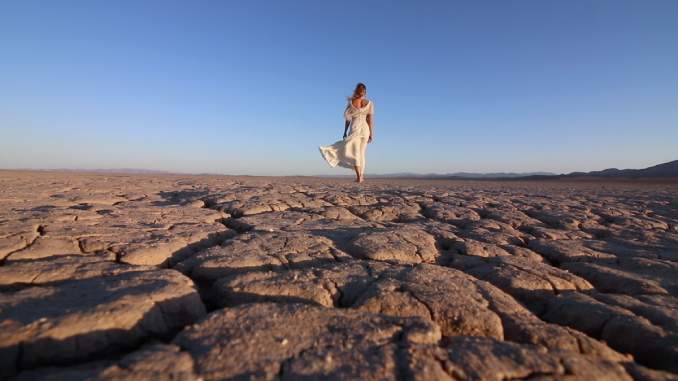A Flashlight Stroll through Hell Keeps The Outwaters‘ Uneven Indie Horror Alive

There’s a Flash-based prank, called the Scary Maze Game, where you move your cursor ever so delicately along a winding path—careful to avoid its edges—until a fully demonized Linda Blair bursts onto the screen, accompanied by a headphone-frying scream. Gotcha! The Outwaters is less interested in getting us to jump, but it directs our attention and sightline with a similar intensity and purpose that can feel just as calculating and just as fundamentally effective. Warping found footage language to establish its first-person perspective, it makes us its true victims and observers. Even if the shaky set-up sending us to our fate and the inscrutable horrors we’re eventually led through never truly coalesce into anything meaningful, there’s a primal, technical effectiveness that the Scary Maze Game programmers would envy. More than a freaky JPEG awaits us out in the dark desert, but the one-man-band indie from Robbie Banfitch (he wrote, directed, edited and shot the movie, and did its VFX and sound design) works better as a showcase of his skills than as a piece of weird fiction.
From its opening moments, The Outwaters is fast and loose with the language of its subgenre—slinging slang at those too prepared with Blair Witch Project comparisons—in order to plant something rotten in our guts. A 911 call, featuring a ridiculously unphased operator’s repetitive requests over a soundscape of people having a very bad time, is solely concerned with sowing dread. Representative of the rest of the film, though, its toothlessly one-note idea (something wicked this way comes) can’t support the amount of screen time it’s given, let alone effectively gnaw at us over the course of The Outwaters’ overlong establishment of the ordinary.
We know something bad is going to happen to these people. We always knew. Teasing us up top only rubs in how long we’re asked to wait (and how dull what we’re asked to wait through is) before getting to a place where The Outwaters feels comfortable trying something. What makes found footage narratives sustainable through their dry, relatable build-ups—through the “it was a night just like this” phases of the campfire stories—is tactical immersion. Rarely will we ever truly care about the party or the documentary or whatever justification we’re given as to why the camera is rolling, but investing in this logic early makes it all the scarier when it’s assaulted by the illogical.
The Outwaters’ excuse is flimsier than normal. Music video director Robbie (Banfitch), his quiet writer brother Scott (Scott Schamell) and Robbie’s stylist pal Angela (Angela Basolis) venture out into the Mojave on a shoot with their singer friend Michelle (Michelle May). But like so much underwhelming found footage, there’s not an immediate gimmick as to why Robbie is filming everything leading up to this pursuit of neo-hippy folk stardom. Cigars are smoked. Gifts are opened. Friends are recruited. It’s not Lake Mungo’s horror mockumentary or Cloverfield’s ogling disaster spectatorship. Mostly, it evokes your dad’s newfound fascination with his camcorder—and even he had some parameters for when he’d break it out. Sillier, though, is how we’re watching this feature-length cut: The cops apparently recovered and chronologically assembled this footage from a trio of memory cards. If the film stops making sense later (and it will), it could just be that the police aren’t particularly skilled at maintaining cosmic horror continuity.
It’s a friction produced by wanting to be both epistolary—made of documentation discovered and assessed after the atrocities—and vital, in-the-moment, embodied horror. Two approaches to realism collide, ironically drawing more attention to their production. But when Banfitch’s horror auteurism shakes free from the framing restraints of its subgenre, its painstakingly curated sensory experience ravages you.
-

-

-

-

-

-

-

-

-

-

-

-

-

-

-

-

-

-

-

-

-

-

-

-

-

-

-

-

-

-

-

-

-

-

-

-

-

-

-

-








































